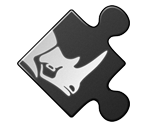Auto Label Objects
Windows only
Demonstrates how to automatically label objects using RhinoScript.
Option Explicit
'
' AutoLabel Subroutine
'
Sub AutoLabel
' Declare variables
Dim arrDirPoint1, arrDirPoint2, arrSortDir, arrObjects, arrPoint, arrItem, arrArea, arrPrompts, arrCollect()
Dim strObject, strName, strDot
Dim intCount, intSuffix, intXDir, intYDir, intZDir
Dim i, j, temp
' Select objects
arrObjects = Rhino.GetObjects("Select objects to name")
If Not IsArray(arrObjects) Then Exit Sub
' Prompt for a prefix to add to the labels
strName = Rhino.GetString("Prefix for labels, press Enter for none")
If Not IsString(strName) Then Exit Sub
' Prompt for a suffix starting number
intSuffix = Rhino.GetInteger("Starting base number to increment",0)
If IsNull(intSuffix) Then Exit Sub
' Prompt for direction
arrDirPoint1 = Rhino.GetPoint("Base point for sort direction")
If IsNull (arrDirPoint1) Then Exit Sub
arrDirPoint2 = Rhino.GetPoint("Pick point for sort direction", arrDirPoint1)
If IsNull (arrDirPoint2) Then Exit Sub
' Determine Direction of sort for each axis, 0 is Negative Direction, 1 is positive
If arrDirPoint1(0) > arrDirPoint2(0) Then
intXDir = 0
Else
intXDir = 1
End If
If arrDirPoint1(1) > arrDirPoint2(1) Then
intYDir = 0
Else
intYDir = 1
End If
If arrDirPoint1(2) > arrDirPoint2(2) Then
intZDir = 0
Else
intZDir = 1
End If
arrSortDir = Array(intXDir, intYDir, intZDir)
' Initialize collection counter
intCount = 0
' Process each seleted object
For Each strObject In arrObjects
' Process curves
If Rhino.IsCurve(strObject) Then
' Get the curve starting point
arrPoint = Rhino.CurveStartPoint(strObject)
' Append the object name to the point array
ReDim Preserve arrPoint(3)
arrPoint(3) = strObject
' Append the modified point array to the collection
ReDim Preserve arrCollect(intCount)
arrCollect(intCount) = arrPoint
' Increment collection counter
intCount = intCount + 1
End If
' Process surfaces
If Rhino.IsSurface(strObject) Then
' Get the Surface center point
arrArea = Rhino.SurfaceAreaCentroid (strObject)
arrPoint = arrArea(0)
' Append the object name to the point array
ReDim Preserve arrPoint(3)
arrPoint(3) = strObject
' Append the modified point array to the collection
ReDim Preserve arrCollect(intCount)
arrCollect(intCount) = arrPoint
' Increment collection counter
intCount = intCount + 1
End If
' Process points
If Rhino.IsPoint(strObject) Then
' Get the Point Corrdinates point
arrPoint = Rhino.PointCoordinates (strObject)
' Append the object name to the point array
ReDim Preserve arrPoint(3)
arrPoint(3) = strObject
' Append the modified point array to the collection
ReDim Preserve arrCollect(intCount)
arrCollect(intCount) = arrPoint
' Increment collection counter
intCount = intCount + 1
End If
'
' TODO: add support for additional object types here
'
Next
' Validate the collection
If Not IsUpperBound(arrCollect) Then Exit Sub
' Bubble sort the collection
For i = UBound(arrCollect) - 1 To 0 Step -1
For j = 0 To i
If CompareItems(arrCollect(j), arrCollect(j+1), arrSortDir) = True Then
temp = arrCollect(j+1)
arrCollect(j+1) = arrCollect(j)
arrCollect(j) = temp
End If
Next
Next
' Process each item in the collection
For i = 0 To UBound(arrCollect)
' Get an item from the collection
arrItem = arrCollect(i)
' Rebuild the point array
arrPoint = Array(arrItem(0), arrItem(1), arrItem(2))
'Curves need to have the textdot at thier Midpoint
If Rhino.IsCurve(arrItem(3)) Then
arrPoint = Rhino.CurveMidPoint(arrItem(3))
End If
' Add a text dot at the point location
strDot = Rhino.AddTextDot(strName & CStr(intSuffix + i), arrPoint)
' Set the dot name to the originating object
Rhino.ObjectName strDot, arrItem(3)
Rhino.ObjectName arrItem(3), strName & CStr(intSuffix +i)
Rhino.SetObjectData arrItem(3), "AutoCount", "DotUiid", strDot
Next
End Sub
'
' Compare function for bubble sort
'
Function CompareItems(x, y, dir)
If x(0) > y(0) Then
If dir(0) = 1 Then
CompareItems = True
Else
CompareItems = False
End If
ElseIf x(0) = y(0) Then
If x(1) > y(1) Then
If dir(1) = 1 Then
CompareItems = True
Else
CompareItems = False
End If
ElseIf x(1) = y(1) And x(2) >= y(2) Then
If dir(2) = 1 Then
CompareItems = True
Else
CompareItems = False
End If
Else
If dir(1) = 1 Then
CompareItems = False
Else
CompareItems = True
End If
End If
Else
If dir(0) = 1 Then
CompareItems = False
Else
CompareItems = True
End If
End If
End Function
'
' Returns a Boolean value indicating whether an
' expression can be evaluated as a string
'
Function IsString(ByVal str)
IsString = False
If VarType(str) = vbString Then IsString = True
End Function
'
' Returns a Boolean value indicating whether an
' array has been dimensioned.
'
Function IsUpperBound(ByVal arr)
IsUpperBound = False
If IsArray(arr) Then
On Error Resume Next
UBound arr
If Err.Number = 0 Then IsUpperBound = True
End If
End Function

